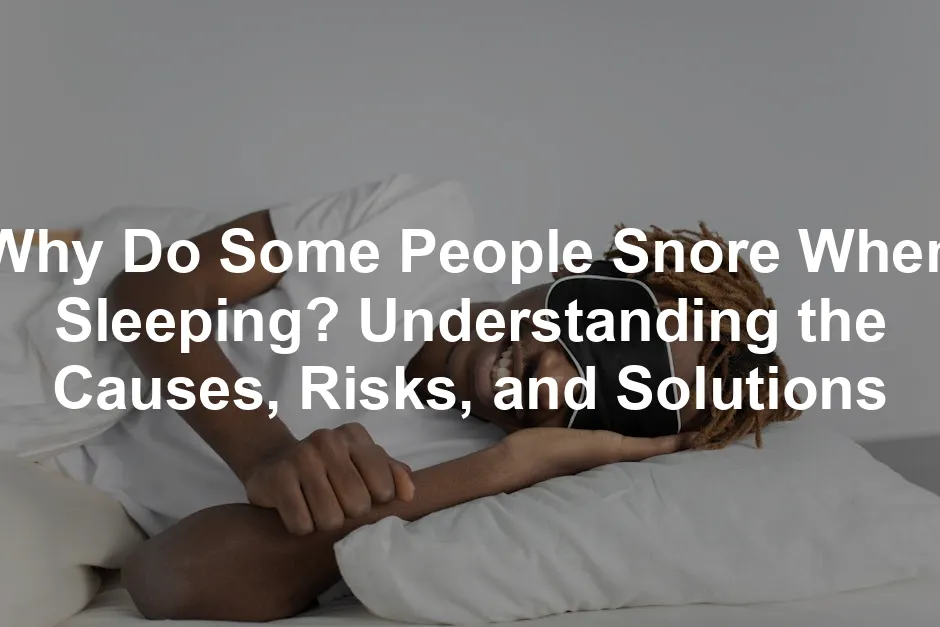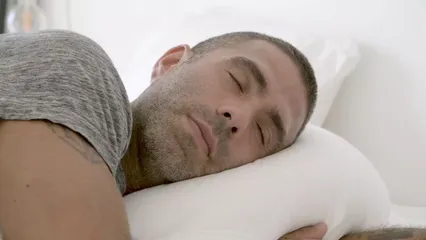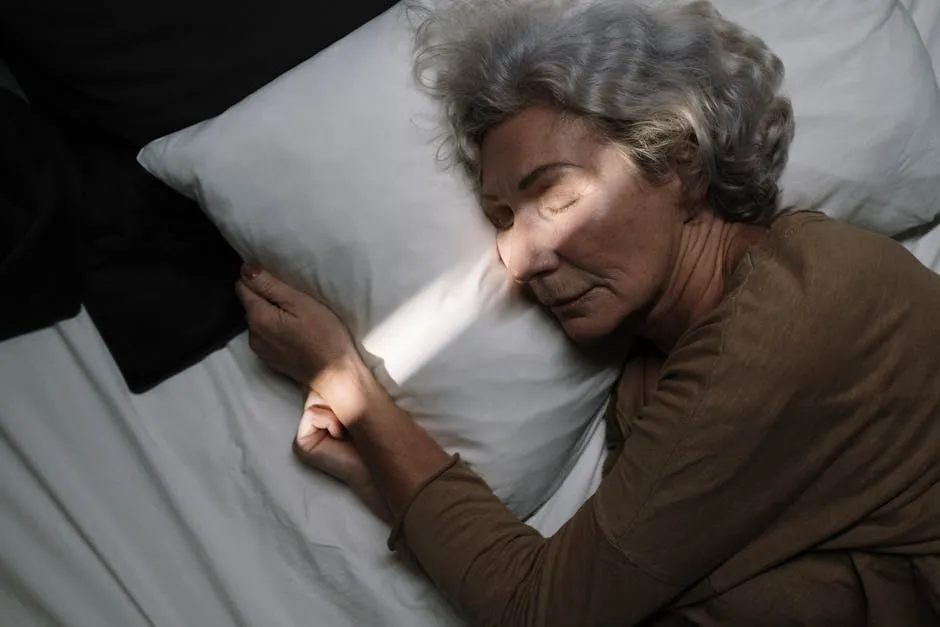
Why Do Some People Snore When Sleeping? Understanding the Causes, Risks, and Solutions
Introduction
Snoring is a common phenomenon, affecting nearly half of adults at some point. Often perceived as a mere nuisance, it can disrupt sleep for partners and lead to some serious health concerns. Snoring is typically associated with relaxed throat muscles and airway obstructions. But here’s the kicker: it can also signal underlying issues like obstructive sleep apnea (OSA), a condition that pauses breathing during sleep. Understanding snoring is crucial, as it can indicate more than just a noisy night. For many, it’s a wake-up call to assess their health. This article aims to shed light on why some people snore, the health implications that come with it, and possible solutions to reduce or eliminate this nocturnal symphony. So, if you or a loved one is a frequent snorer, keep reading to discover the ins and outs of this sleep challenge.
Understanding Snoring
What is Snoring?
Snoring occurs when airflow is obstructed during sleep, causing the soft tissues in the throat to vibrate. This results in a variety of sounds, from gentle vibrations to loud grumbling. While almost everyone snores at some point, studies show that about 40% of adult men and 24% of women are regular snorers.Types of Snoring
Primary Snoring
Primary snoring refers to snoring that doesn’t disrupt sleep or lead to health issues. It’s often harmless, causing little more than a few eye rolls from bed partners. This type of snoring does not usually result in daytime fatigue or significant breathing interruptions.Sleep-Disordered Breathing
On the other hand, sleep-disordered breathing includes conditions like obstructive sleep apnea (OSA). This serious disorder is marked by repeated breathing interruptions during sleep, often accompanied by loud snoring. People with OSA may experience significant health risks, including high blood pressure, cardiovascular issues, and increased daytime sleepiness. Recognizing the difference between these types of snoring is vital. Not all snorers have OSA, but most people with OSA do snore. Understanding these nuances can help individuals seek appropriate medical advice and treatment options.
Causes of Snoring
Snoring is not just a pesky nighttime disturbance; it’s a multifaceted issue influenced by various factors. Let’s unravel the reasons behind this nocturnal symphony.Anatomical Factors
Airway Structure
The size and shape of your airway play a starring role in snoring. For instance, a deviated septum can narrow airflow, creating a perfect environment for snoring. Enlarged tonsils and adenoids also contribute significantly. Picture this: a tight squeeze in your throat, and air struggles to pass through. The result? Vibrations that translate into that unmistakable sound we all know too well.Age and Gender
Age isn’t just a number; it’s a significant player in snoring. As we age, muscle tone decreases, and our airways tend to narrow. This can lead to a greater likelihood of snoring. Additionally, snoring is more prevalent in males. Studies show around 42% of men snore regularly, compared to 31% of women. So, if you’re a guy in your golden years, brace yourself; your snoring may be more prominent than ever! To combat this, consider using a Nasal Strips for Snoring Relief. These little heroes can open up your nasal passages, giving you a better shot at a peaceful night’s sleep and a happier partner!
Lifestyle Factors
Obesity
Excess weight, particularly around the neck, can constrict airflow. Think of your neck as the hose of a vacuum cleaner. If it gets too thick, the air struggles to flow through, leading to snoring. Losing weight could be a game-changer in reducing those nighttime noises. For those looking to shed some pounds, a Yoga Mat for Home Fitness might just be your best friend. Get your stretch on and kickstart that fitness journey from the comfort of your living room!
Alcohol and Sedatives
A nightcap might help some wind down, but it can do wonders for your snoring. Alcohol and sedatives relax the throat muscles, resulting in increased vibrations as air passes through. If you want a quieter night, it’s best to skip the drinks before bed!Health Conditions
Nasal Congestion
Chronic nasal congestion can be a significant culprit in snoring. Allergies, colds, or environmental irritants can inflame nasal passages, blocking airflow. When your nose is stuffy, your body compensates by breathing through your mouth, increasing the chances of snoring. So, if your nose is anything but clear, prepare for a symphony of snores. To help with that congestion, consider using a Decongestant Nasal Spray. It’s a quick fix to clear those passages and get back to breathing easy!
Sleep Position
Your sleep position matters! If you’re a back sleeper, gravity could be working against you. Sleeping on your back can cause your tongue to collapse into the throat, narrowing the airway. Switching to your side could be a simple fix to reduce snoring. If you need a little help staying on your side, a Tennis Ball Sleeping Position Aid can do the trick. Just attach it to your pajamas and enjoy a side-snoozing experience!
Other Medical Conditions
Certain medical conditions, like hypothyroidism, can contribute to snoring. This condition can lead to a buildup of excess tissue in the throat, obstructing airflow. If you suspect an underlying health issue, consulting a healthcare provider is a wise move. Understanding these causes is crucial for tackling snoring effectively. Whether it’s anatomical factors, lifestyle choices, or health conditions, there are strategies to mitigate this nighttime nuisance. If snoring disrupts your sleep or your partner’s, consider exploring these causes and consult a professional for tailored advice. After all, a peaceful night’s sleep is worth the effort!
Symptoms and Risks Associated with Snoring
Common Symptoms
Snoring isn’t just a nighttime soundtrack; it can come with a variety of unwelcome companions. If you’re waking up feeling like you’ve been through a wrestling match, you might be experiencing excessive daytime sleepiness. This is no fun, especially when your to-do list is longer than your grocery list! Morning headaches can also crash the party, leaving you grumpy before your first cup of coffee. Oh, and let’s not forget about gasping or choking during sleep. It’s like your body is playing a real-life game of “Guess Who’s Not Breathing?” These symptoms can indicate that your snoring might be more than just a harmless nuisance. If your night sounds like a zoo, it’s time to pay attention.
Health Risks
Chronic snoring can lead to a host of health risks, particularly when it comes to obstructive sleep apnea (OSA). OSA is not just a mouthful; it’s a serious condition that can wreak havoc on your health. One of the primary concerns is cardiovascular issues. Your heart might just be less than thrilled with all that interrupted airflow. Imagine it trying to keep up with a marathon runner while you’re snoozing! Additionally, studies suggest a significant link between OSA and diabetes. It’s enough to make you rethink that late-night snack. Mental health concerns are also in the mix; chronic sleep deprivation can lead to anxiety and depression because who can handle life’s challenges on a few hours of restless sleep? So, if you or someone you love is snoring regularly, don’t dismiss it as a mere annoyance. Seeking help could save you from a world of health troubles down the line.
Diagnosis and Assessment
When to See a Doctor
Not all snoring warrants a trip to the doctor, but some signs definitely do. If your snoring sounds like a freight train and is accompanied by frequent pauses in breathing, it’s time to consult a healthcare professional. Morning headaches or persistent daytime sleepiness also raise red flags. If you find yourself feeling more like a zombie than a functioning human, it’s definitely worth discussing with a doctor. Don’t ignore symptoms like gasping or choking during sleep. These signs could mean your body is not getting enough air, and trust us, that’s a conversation you want to have sooner rather than later.
Diagnostic Methods
When you finally make it to the doctor’s office, expect a thorough evaluation. First up, they’ll want to chat about your medical history and your sleep habits. This is where your partner’s input can be invaluable; they might have a better idea of your nighttime escapades than you do! Next, a sleep study, known as polysomnography, might be on the agenda. This fancy term involves monitoring your brain activity, breathing patterns, heart rate, and even movements while you snooze. It’s like a reality show but with fewer drama queens! This study helps pinpoint the severity of your snoring and any potential underlying conditions. So, if you’re experiencing problematic snoring, don’t hesitate to seek medical advice—your health is worth it!
Treatment and Management of Snoring
Snoring can be more than just a loud nuisance; it can indicate underlying health issues such as obstructive sleep apnea (OSA). Fortunately, there are several strategies available for managing and treating snoring. Whether it’s lifestyle modifications, medical treatments, or home remedies, let’s explore the options that can help you (and your bed partner) achieve a more restful night.Lifestyle Modifications
Making simple lifestyle changes can have a significant impact on snoring. First off, losing weight is key. Extra weight around the neck can constrict your airway, making snoring more likely. So, if you’ve been avoiding that gym membership, it might be time to rethink your fitness goals! Another effective strategy is to adjust your sleep position. Sleeping on your back can cause your tongue to collapse into your throat, further narrowing your airway. Instead, try sleeping on your side. You can even use a tennis ball trick—sew a pocket into the back of your pajamas to keep you from rolling over. Goodbye, back-sleeping; hello, peaceful nights! Additionally, establishing a consistent sleep routine can enhance sleep quality. Aim for a full night’s rest, as sleep deprivation can relax throat muscles and worsen snoring. Trust us; your body will thank you when it’s not fighting to stay awake during the day! And if you’re looking for a little extra comfort, consider investing in a Adjustable Bed Pillow. It can help ensure your head and neck are aligned, making it easier to breathe throughout the night.
Medical Treatments
When snoring becomes a persistent issue, medical treatments may be necessary. One well-known option is Continuous Positive Airway Pressure (CPAP) therapy. This device delivers a steady stream of air through a mask, keeping your airway open while you sleep. It’s particularly beneficial for those diagnosed with OSA. If your doctor recommends CPAP, don’t be put off by the mask. It might just save your sleep—and your partner’s sanity! Another alternative is oral appliances. These custom-fitted dental devices help reposition the jaw and tongue to prevent airway obstruction. They’re often a great option for individuals who find CPAP uncomfortable or cumbersome. Your dentist can provide guidance on choosing the right device for you. For those with severe snoring issues that don’t respond to other treatments, surgical options may be considered. Surgical interventions, such as uvulopalatopharyngoplasty (UPPP), involve removing excess tissue from the throat to widen the airway. Another option is a tonsillectomy, which removes enlarged tonsils that may contribute to snoring. While surgery can be effective, it’s often a last resort after exploring other avenues.
Home Remedies and Preventative Measures
Before resorting to medical interventions, many people find success with home remedies and preventative measures. One effective tip is using nasal strips. These external strips can help keep nasal passages open, making it easier to breathe through your nose. If congestion is an issue, consider using a Humidifier for Dry Air Relief to maintain moisture in the air, especially during dry seasons. Staying hydrated is also crucial. Dehydration can lead to thicker mucus, which may contribute to snoring. Aim to drink enough water throughout the day, and limit alcohol and sedatives before bedtime, as both can relax throat muscles and exacerbate snoring. Finally, consider practicing throat exercises! These exercises strengthen the muscles in your throat, potentially reducing snoring. Simple activities like repeating vowels or pushing your tongue against the roof of your mouth can make a difference. It’s like a workout for your throat, and you can do it while watching your favorite show! By implementing these lifestyle modifications, exploring medical treatments, and trying out home remedies, you can take significant steps toward reducing snoring. Not only will you improve your own sleep quality, but you’ll also give your partner a much-needed break from the symphony of snores. Sweet dreams await!
FAQs
Do all snorers have sleep apnea?
Not all snorers have obstructive sleep apnea (OSA), although many do. Snoring can occur for various reasons, including anatomical features and lifestyle factors. While OSA is often marked by loud snoring and interruptions in breathing, some individuals may snore without experiencing sleep apnea. If you’re concerned, consult a healthcare provider for a proper evaluation.
How can I tell if I snore?
Curious if you snore? There are a few ways to find out! Ask your partner or roommate if they’ve noticed any nighttime noises. Alternatively, you can record yourself while sleeping using a smartphone or audio recorder. This way, you can listen for any snoring sounds when you review the recording.
Is snoring harmful for children?
Snoring in children can be concerning. While occasional snoring is usually harmless, persistent loud snoring, especially if accompanied by symptoms like gasping or difficulty focusing, should prompt a visit to a pediatrician. It can indicate issues with tonsils or adenoids, and addressing these concerns early is essential for your child’s health.
What are some quick fixes for snoring?
If you’re looking for quick remedies to reduce snoring, try these tips: – Sleep on your side instead of your back. – Use nasal strips to help keep your nasal passages open. – Elevate your head with an extra pillow. – Avoid alcohol and sedatives before bedtime. These simple changes might help you or your partner enjoy quieter nights!
When should I seek medical help for snoring?
It’s wise to consult a healthcare professional if snoring disrupts your sleep or your partner’s sleep consistently. Pay attention if you experience symptoms like excessive daytime sleepiness, morning headaches, or gasping for air at night. These could be signs of a more serious condition, such as sleep apnea, which requires medical attention. Taking action early can lead to better sleep and improved health!
Please let us know what you think about our content by leaving a comment down below! Thank you for reading till here 🙂If you’re looking for insights on how to stop snoring, you can find valuable information in this article: Why do some people snore and how to stop snoring
All images from Pexels




